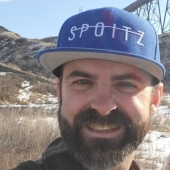
Primary processing and testing of seaweed to maximize market access
Spencer Serin, Head of Science, Spoitz Liquified Seaweed, Canada

Primary processing and testing of seaweed to maximize market access
Spencer Serin, Head of Science, Spoitz Liquified Seaweed, Canada
About speaker:
Dr. Spencer Serin completed his PhD at the University of British Columbia, Canada in 2016 and studied the synthesis, characterization, and applications of novel phosphorus containing materials. In 2020, he completed postdoctoral research studying the use of an invasive red seaweed (Mazzaella japonica) for improving the performance and potential for methane reduction in beef cattle finishing. As a private consultant and co-founder of Spoitz Enterprises Inc. (spoitzinc.ca), he works as a food safety consultant, agriculture product developer, and in research project design/management. This work has contributed to the commercialization of seaweed products in food, animal feed, and plant health – specifically focused on product validation and registration. In March 2024, he co-founded Spoitz Liquified Seaweed (SLS) with chemistry and processing specialist Dr. Fraser Pick. SLS provides toll processing of seaweed to produce liquid ingredients for agriculture, food, and human health applications. Dr. Serin has had the pleasure of collaborating with universities, governmental research organizations (Agriculture and Agri-food Canada and United States Department of Agriculture), and most recently the Southeast Conference/Alaska Mariculture Cluster as a technical scientific consultant in seaweed chemical analysis and processing.
Company:
Spoitz Liquified Seaweed (SLS) is on a mission to build the seaweed industry in North America by offering a new service - customizable seaweed primary processing – designed to create a range of stabilized liquid and solid products for the food, agriculture, and chemical industry use. SLS is at its core a chemical company that is designed to support both seaweed growers and buyers of seaweed-derived products. Seaweed products generated by SLS meet the most stringent manufacturing standards. We believe established primary processing strategies, including detailed product testing and evaluation, must exist for the NA industry to scale and become profitable.
Presentation:
Seaweed is a global feedstock for a range of high-value products such as food additives, pharmaceuticals, cosmetics, and biologicals. In addition, it often finds applications in comparably lower value, albeit important, sectors such as agriculture and renewable energy. The North American seaweed industry is stalled looking for suitably sized and valued markets to sell to that will provide appropriate values for this incredible resource. Until a complete picture of the value-chain is determined, from grower to buyer, it will be difficult for the industry to scale.
SLS is working with partners to standardize the processing of landed seaweed by proceeding through a stabilized slurry followed by accurately measuring key chemical and biological markers in the biomass to provide specifications that can be communicated to buyers. This data, which is a range of chemical, biological, and physical characteristics, will provide a detailed overview of the seaweed ingredient that can be advertised to different users of seaweed biomass. Low-cost stabilization of liquified seaweed allows the material to be economically stored under ambient conditions (avoiding immediate freezing or drying) while determining the best markets to sell into that will maximize the crop's value. Harvest seasons are typically narrow, which creates pressure on cost-intensive processing steps like drying. There are a range of chemical and biological stabilization methods available to seaweed growers that will permit a more intentional marketing of their seaweed to capture the highest value opportunities while minimizing spoilage or degradation of important chemicals.
The communication of different seaweed nutrients is dominated by marketing teams which apply general, and rarely substantiated, statements to products such as vitamin content or bioactivity. There is little information about the distinct constituents in most products and the analyses do not meet the detailed scientific rigor common for large land-based agricultural commodities. This is because there are not clear specifications for seaweeds communicated to growers. We are excited to work with growers to maximize the value of their seaweed by stabilizing their material at the height of freshness and measuring the seaweed using validated laboratory methods and experienced service providers. This will create a comprehensive panel of seaweed traits in the form of specification sheets that can be communicated to global buyers and effectively scale the industry.